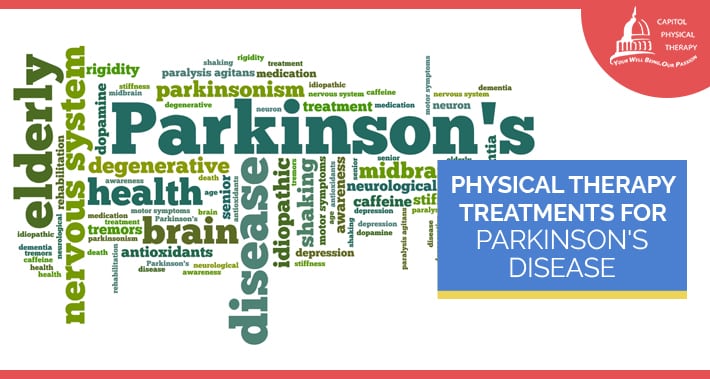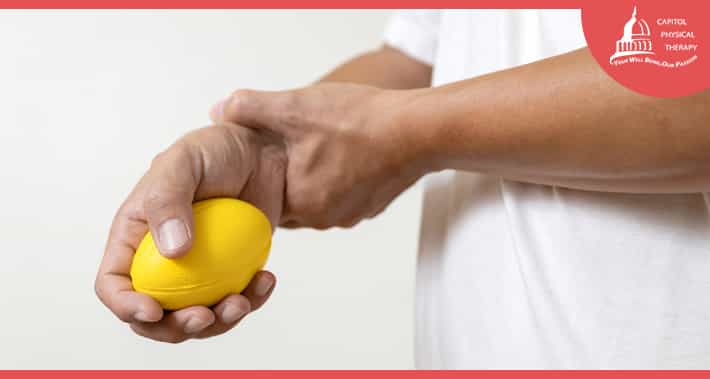
Parkinson’s disease is a chronic, degenerative disease that, depending on the severity, can result in a number of different symptoms.
Parkinson’s disease affects your nervous system, and weakens your immune system.
Aside from physical challenges, this neurological condition can also affect your mental health.
Physical therapy is a great resource to use to slow the effects of this progressive disease, and minimize the impact on your daily life.
Remember to make sure that the clinic you’re considering for treatment has a Parkinson’s disease physical therapist.
This way, you know that they’ll be experienced and knowledgeable about your disease.
At our physical therapy clinic, we offer treatments for Parkinson’s disease, and other neurological conditions.
If you or a loved one has been newly diagnosed with Parkinson’s disease, you might be confused, and even a little overwhelmed at what it means.
So let’s take a closer look.
What Is Parkinson’s Disease?
Parkinson’s disease affects your nervous system, and the parts of your body that are controlled by it.
It impacts numerous areas of your body and function, including mental health, sleep, movement, and pain.
A loss of nerve cells that produce dopamine is characteristic in Parkinson’s disease.
The lack of dopamine creates a chemical imbalance that affects a number of your bodily functions, including movement involved in exercising, thought processes, decision making, and mood regulation.
Tremors or a slowing of your movements are usually one of the first symptoms of Parkinson’s disease.
Once symptoms are detected, it’s recommended to seek out treatment as early as possible.
Some treatments work better in the earlier stages of the disease and can help you maintain bodily functions.
Slurred speech, or no movement on one side of the body may look like a stroke.
However, these symptoms are similar to those found in Parkinson’s disease.
Parkinson’s disease can also cause issues with balance.
Ultimately, it’s a progressive, degenerative disease, which means the disease characteristics worsen over time.
Other examples of progressive diseases include:
- Multiple sclerosis
- Alzheimer’s disease
- Parkinson’s disease
- ALS
- Osteoarthritis
- COPD
Other neurological conditions include:
- Stroke
- Traumatic brain injury
- AlS
- Huntington’s disease
- Ataxia
- Bell’s palsy
- Muscular dystrophy
- Fibromyalgia
Parkinson’s disease can also frequently result in issues with the vestibular system.
Parkinson’s disease is often comorbid with other diseases that involve issues with balance.
Physical therapy for vestibular disorders may be beneficial if you have Parkinson’s disease.
What Causes Parkinson’s Disease?
Parkinson’s disease is caused by an issue with a part of your brain called the >substantia nigra.
The nerve cells in this area are responsible for producing dopamine.
With Parkinson’s disease, these nerve cells begin to slowly and gradually break down and die off.
A reduction in dopamine can result in issues with movement and other critical bodily functions.
The reason why this happens isn’t known.
Some factors that may contribute to the onset of the disease include family history, aging, exposure to particular environmental toxins, or biological sex.
This 2004 paper showed men are 1.5 times more likely to develop Parkinson’s disease than women.
As a result, physical therapy for men is more likely to involve treatment for Parkinson’s disease than physical therapy for women.
Because it’s a disease commonly associated with aging, physical therapy for seniors often involves treatment for Parkinson’s disease.
There are no known prevention measures for Parkinson’s disease since the causes are not widely known.
However, research suggests that exercise and physical activity may be beneficial.
Some exercises that may benefit you could include pilates, yoga, and other outdoor activities.
Drinking coffee may also help to reduce your risk of Parkinson’s disease compared to those who do not drink coffee.
Although, it’s important to keep in mind that excessive caffeine intake can also increase your risk of heart disease.
What Are The Symptoms Of Parkinson’s Disease?
The symptoms of Parkinson’s disease vary depending on the severity of the disease.
It progresses at different rates in different people, so the severity isn’t necessarily age based.
Some minor symptoms can develop many years before you notice any movement related symptoms develop.
These include a decreased sense of smell, light headedness when standing, and sleep challenges.
The initial motor symptoms of Parkinson’s disease can start off very mild.
One common example is a tremor in one hand when you’re resting.
You may also experience tremors in your legs or jaw.
At this stage, daily activities are not usually impacted by these tremors.
As it progresses, other common motor symptoms include:
- Movements like walking become smaller than usual
- Muscle rigidity
- The need for chronic pain treatments
- Neck pain
- Insomnia
- Shoulder pain
- Lower back pain
- Poor posture
- The need for treatments for poor balance
- Slowed movements
- Stooped posture
- Difficulty speaking at a normal volume
- Difficulty swallowing, or making facial expressions
You may also experience bursitis.
This condition causes inflammation in fluid filled sacs in your body joints that can cause pain.
Inflammation can cause pain to occur in your shoulders, hips, neck, or back.
Those with Parkinson’s disease typically show changes in specific areas of the brain.
Lewy bodies, and alpha-synuclein protein found in the Lewy bodies, are present among these areas of the brain.

How Does A Physical Therapist Diagnose Parkinson’s Disease?
No single test can completely diagnose Parkinson’s disease.
This can make it a little tricky to diagnose.
Your physical therapist will recommend you to a neurologist for a neurological examination based on your medical history and symptoms.
This is the case especially if you have many of the common symptoms listed above, or they only manifest on one side of your body.
Many people with Parkinson’s disease may also develop dementia, so it’s important to be mindful of any associated signs and symptoms that you may notice.
How Physical Therapists Treat Parkinson’s Disease
Unfortunately there are no known cures for Parkinson’s disease.
However, treatments for Parkinson’s diseases, such as physical therapy, may help manage symptoms and decrease its rate of progression.
Parkinson’s disease affects each person very differently.
For this reason, your physical therapist will carry out a comprehensive evaluation to examine your posture, strength, flexibility, walking, balance, endurance, and coordination.
Then, they’ll use these results to create a custom treatment plan to help you stay active, independent, and mobile for as long as possible.
This treatment plan may include:
- Gait training physical therapy
- Pain management physical therapy
- Fall prevention strategies
- A wellness program to maintain your strength and fitness level
- Hand therapy to maintain your fine motor skills
More specifically, your physical therapist will help you:
- Develop effective strategies to get in and out of bed, chairs, and cars
- Learn to turn over in bed more easily
- Improve your walking coordination
- Improve your pivot, and change directions efficiently
- Improve your stair climbing ability
- Learn to continue to participate in your treatment, and the activities you care about
There are different treatments for different stages of your Parkinson’s disease.
LSVT Big Treatments is just one of the treatments for Parkinson’s disease.
This treatment can be used at any stage of the disease, but it’s best to implement it early on.
LSVT works best in the earlier stages to help you regain your ability to control movements.
Dry needling, which is used in treating multiple conditions, can also be used for pain management for Parkinson’s disease.
Overall wellness strategies can be beneficial in the treatment and management of Parkinson’s disease.
With the holidays coming up, there are holiday wellness tips you can use to take care of your health.
If you were instructed to begin taking Parkinson’s disease medications, your physical therapist will know how to time your treatment plan to maximize the effects of your medication.
It’s also sometimes helpful to use a cane, or a walker depending on how your Parkinson’s disease has progressed.
Your physical therapist can work with you to determine if these aids could be helpful to you, or recommend other devices that can help with a variety of daily tasks.
Remember, your physical therapist is a great resource that can also help you with education and answers to any related questions.
They’re here to support you, and maintain your quality of living for as long as possible.
Book Your Appointment With Capitol Physical Therapy Today
You can see there’s a wide variety of benefits that working with a physical therapist can bring you if you have Parkinson’s disease.
Your therapist will create a custom program that will help you stay mobile and comfortable throughout the course of your disease.
It’s important to remember that when considering a physical therapist for you, look for one who has experience working with neurological diseases.
This way, you will be in a better position due to the incredible experience your therapist has.
Book your appointment with Capitol Physical Therapy today.
1331 H St NW #200,
Washington, DC 20005
- https://g.page/capitolptdc
9560 Pennsylvania Ave. # 202,
Upper Marlboro, MD 20772
- https://goo.gl/maps/zjL4NnnuThRhrcS86
Capitol Physical Therapy offers orthopedic and other pain related solutions, with our versitile team of physical therapists in Washington, DC